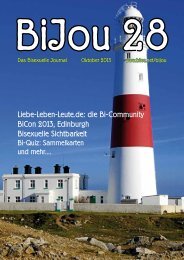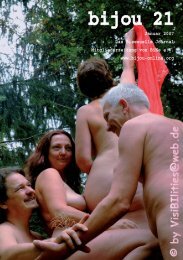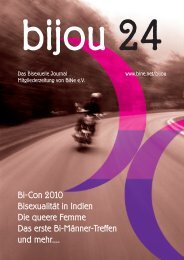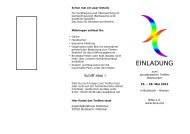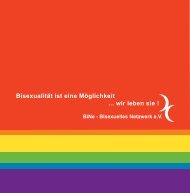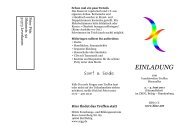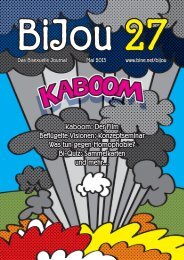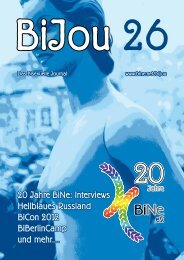BiJou 26 - BiNe Bisexuelles Netzwerk eV
BiJou 26 - BiNe Bisexuelles Netzwerk eV
BiJou 26 - BiNe Bisexuelles Netzwerk eV
You also want an ePaper? Increase the reach of your titles
YUMPU automatically turns print PDFs into web optimized ePapers that Google loves.
suggestion for an easy definition: Bisexual refers<br />
to anyone who is romantically, sexually, or emotionally<br />
attracted to more than one gender regardless<br />
of their own biological, social, or emotional<br />
gender. This is a clear statement which would<br />
put a quick end to any discussion on labels. At<br />
the same time the impact would be huge if the<br />
most well-known association that campaigns for<br />
bisexuality in Germany were to create a definition<br />
which could be universally applicable in this<br />
country. That way we could also argue politically<br />
and socially without getting stumped when we<br />
start talking about pan- or polysexuals, which<br />
according to the definition above would fall under<br />
the bisexual category, as understood by <strong>BiNe</strong>.<br />
A lot of official authorities consider <strong>BiNe</strong> e.V. the<br />
representative for bisexuals in Germany. Inquiries<br />
at the Magnus-Hirschfeld-Stiftung or LSVD,<br />
regarding who was responsible for bisexuals in<br />
Germany, were referred to <strong>BiNe</strong>. <strong>BiNe</strong> is also quite<br />
known in the LGBT community and the AIDS<br />
assistance and the different regional and national<br />
antidiscrimination authorities refer to <strong>BiNe</strong><br />
e.V.<br />
Unfortunately nobody really knows who does<br />
what and who the POC is. Most bisexuals don’t<br />
even know that <strong>BiNe</strong> e.V. exists. And those that<br />
know about it don’t know what <strong>BiNe</strong> e.V. represents.<br />
This is due to a lack of public relations,<br />
visibility, and what the association generally<br />
has to offer. The media impact and visibility is<br />
low, and presence in the media is moderate to<br />
non-existent. There is no news or information<br />
made available to the public. One problem of us<br />
bisexuals is our low degree of visibility to the<br />
outside world. It’s just too bad if the association<br />
that wants to represent them has the same<br />
problem. Of course there’s some good stuff, like<br />
the <strong>BiJou</strong>, but no press releases, statements, or<br />
meddling in politics and social discussions. And<br />
if it does happen, it’s done in quiet, secret and<br />
silence.<br />
So here’s the question, “ Where are you going<br />
<strong>BiNe</strong>?” What does the association hope to accomplish?<br />
What do the members want? Right<br />
now there are a few active members but these are<br />
far too few to actively address the above mentioned<br />
problems. Fact is, too few members get<br />
involved in voluntary work for the association<br />
in proportion to the total number of members.<br />
On top of that majority of the <strong>BiNe</strong> members are<br />
well over 40 years old. In the past we missed<br />
<strong>BiJou</strong> <strong>26</strong><br />
16<br />
out on preparing the association for the future.<br />
The generation gap is significantly noticeable.<br />
The questions that arise here are: How do we<br />
promote voluntary work and involvement in the<br />
association? How do we make it attractive? And<br />
do those that get actively involved get enough<br />
recognition to keep them motivated and committed<br />
to keep working on bisexual issues? What<br />
kind of support is available through the association,<br />
financially as well as organisationally? Does<br />
it maybe make sense in the long run to further<br />
establish the association by hiring up to two full<br />
time staff for the office? Or does it make more<br />
sense to completely rely on voluntary work?<br />
Currently the big meetings shape the association,<br />
be it the open meetings, the low budget-,<br />
men’s-, or women’s meetings. It seems like the<br />
main purpose of <strong>BiNe</strong> is social networking. But<br />
the meetings don’t reach enough people. They’re<br />
nice and the different activities are fun, but is<br />
this the point and purpose of an association that<br />
calls itself Bisexual Network? Isn’t its responsibility<br />
to connect, build a social and political network,<br />
and to attempt to link as many bisexuals<br />
and friends as possible?<br />
The political new beginning could be pretty simple.<br />
A representative conference of bisexuals in<br />
the republic. Anyone who commits themselves to<br />
bisexual issues would be invited, even beyond<br />
the association, be it in groups like Stammtisches<br />
(translator’s note: regular get togethers),<br />
open meetings, or on the internet. International<br />
guests or guests from other groups of the LGBT<br />
and queer spectrum can join in at later meetings.<br />
The first conference should serve to build awareness<br />
and a community for bisexual concerns<br />
in Germany, the foundation for advocacy, as is<br />
the case with other queer clubs and associations.<br />
At the same time our presence in modern media<br />
such as the internet or social networks like Facebook<br />
and Google + could be improved. It’s a<br />
wonderful opportunity to quickly and effortlessly<br />
reach thousands of people.<br />
<strong>BiNe</strong> is 20 years old now, certainly a reason to<br />
celebrate for those who made the association<br />
what it is today, who were steady companions<br />
and put a lot of effort into working out bisexual<br />
and queer issues in Germany and beyond.<br />
But it’s not a reason for bisexuals in Germany<br />
and around the world to celebrate. The situation,<br />
visibility, and public acceptance of bisexuals<br />
in the republic have only marginally changed.<br />
Biphobic prejudice is as prevalent as ever, and<br />
we’re lacking in proper research on bisexuality in<br />
the social and sexual sciences. To remedy this we<br />
can only educate with the aid of solid research.<br />
It would be conceivable to promote research<br />
through <strong>BiNe</strong> e.V. An easy way would be to annually<br />
declare a certain amount of prize money<br />
for relevant research on bisexuality. Young social<br />
scientists, especially, would be glad for the money<br />
and might be more motivated to do their<br />
theses and dissertations in this field.<br />
How and whether <strong>BiNe</strong> e.V. will evolve is up to<br />
the members. We shouldn’t forget that when a<br />
bee (translator’s note: in German “Biene”; wordplay<br />
on the association’s name) loses its stinger,<br />
it dies. Luckily <strong>BiNe</strong> isn’t an insect, but I do<br />
miss our stinger, and I fear that in the long run<br />
it might meet the same fate. But there are still<br />
committed members that want to keep that from<br />
happening. Keeping the association alive, organising<br />
meetings, writing the <strong>BiJou</strong> – when will<br />
you become a hard working bee, too?<br />
John<br />
<strong>BiJou</strong> <strong>26</strong><br />
17<br />
Quo vadis?<br />
Obscure gay-conversion therapies prohibited in California<br />
It’s no secret that the US tends to implement strange ideas sometimes.<br />
But now at least one of them will be put to an end. The scientific<br />
and psychological attempts to convert young gay homosexuals<br />
to heterosexuality have been prohibited by Governour Jerry Brown<br />
starting 2013. http://tinyurl.com/gayconversionban



